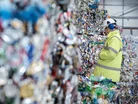Ball Corporation Leads Beverage Sector Aluminium Can Surge

Global demand for aluminium is projected to increase by 40% by 2030, driven by its recyclability and lower carbon footprint compared to other packaging materials, according to a leading industry expert.
Aluminium is vital in global food and drink packaging, preserving freshness and protecting contents.
However, it has been a worldwide challenge to improve the recyclability of food and drink packaging that contains aluminium.
Despite being highly recyclable when isolated, aluminium in mixed packaging often hinders the recyclability of many products, presenting a significant environmental concern for the food and beverage industry.
Yet Ball Corporation – a leading American manufacturer of sustainable aluminium packaging for beverages and food products – is implementing innovative strategies to decarbonise the aluminium industry.
The company’s Climate Transition Plan revolves around harnessing transparent data, proven technologies and partnerships to achieve circularity, with minimal reliance on offsetting.
The company has unveiled its most sustainable aluminium aerosol can to date, boasting a carbon footprint 50% lower than standard cans.
Aluminium's development across the food industry
The aluminium can has been a cornerstone of the food and beverage industry since its introduction in the 1950s.
The collaboration between Ball Corporation and beverage giants like Coca-Cola and PepsiCo is driving innovation in aluminium can production.
The companies are focusing on lightweight designs, increasing recycled content and using renewable energy in manufacturing.
Coca-Cola, for instance, aims to make 100% of its packaging recyclable globally by 2025 and use at least 50% recycled material in its packaging by 2030.
Similarly, PepsiCo has committed to reducing virgin plastic content across its beverage portfolio by 50% by 2030.
These advancements not only reduce environmental impact but also offer cost savings and improved efficiency across the supply chain.
Collaborative efforts for a greener future
Ball Corporation is working closely with its supply chain partners to achieve an average of 85% recycled content in the aluminium used to produce beverage cans, bottles and cups in its operating regions by 2030.
The company has also co-founded the First Movers Coalition (FMC), a global initiative leveraging the purchasing power of companies to decarbonise hard-to-abate industrial sectors, including aluminium.
The coalition aims for at least 10% of annual primary aluminium purchases to be near-zero emissions by 2030.
Predrag Ozmo, Sustainability Director at Ball Corporation, emphasises the importance of this transition: "The aluminium industry emits more than 1 billion tons of CO2 a year. With consumers placing more importance on sustainability, we have a unique opportunity to lead the way on decarbonisation for the sector and beyond."
He further adds: "Ball Corporation is a strong advocate for public-private collaboration across the entire value chain as a catalyst for change at scale. We hope to see more of this kind of collaboration across the upstream and downstream value chain as industry-wide decarbonisation efforts gain momentum."
--------------
Make sure you check out the latest news at Food Digital, a BizClik brand




